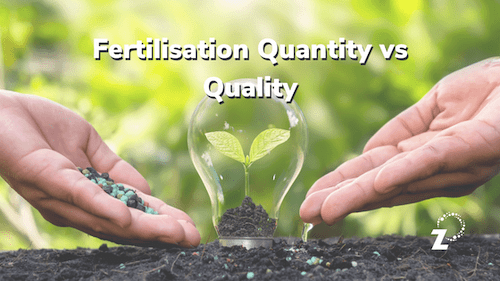Russia’s invasion of Ukraine has led to a spike in global grain and fertiliser prices as it became extremely difficult to get exports out of the country. Although a United Nations-brokered deal has eased some of the supply chain issues, fertiliser costs remain high—fertilisers are at their least affordable levels since the 2008 global food crisis, putting a strain on farmers across the continent and around the world.
Even before fertilizer prices skyrocketed, fertilisation has long been one of the most challenging inputs for farmers to manage—it’s expensive, and not always easy to decipher the type, quantity and quality of fertiliser that will produce the best outcomes. Another complexity is that there are many other factors that come into play when it comes to overall yield, so it’s difficult to isolate fertilisation as a wholly-determining factor in crop performance. In this blog post, we discuss ways in which farmers can begin to apply fertilising inputs in more effective and more efficient ways.
It’s long been known that plants grown commercially (or even for subsistence or on a small scale) need nutrients in order to grow optimally. In the 1800s, it was discovered that the nutrients plants use come primarily from the basic elements in the Earth’s crust. These days, we have good knowledge of what elements all plants require and why they need them. Thus, we supply plants with nutrients manually in order to control and influence the growth and quality of crops.
But how much is enough, and how much is too much?
Is more ‘more’ when it comes to fertilisation?
Like all ecosystems, soil health (and thus plant health) is dependent on a delicate balance of organic and inorganic compounds and their interactions. Although the introduction of fertiliser can be beneficial, it adds another (sometimes foreign) element to this delicate balance. Thus, adding more fertiliser more often doesn’t necessarily lead to a better yield; in fact, it can have the opposite effect. Not only is excess fertiliser environmentally damaging, but it’s also an unnecessary expense for the farmer to incur.
Finding the fertiliser balance
Generally speaking, fertilisation should be based around small, frequently occurring doses. The size of the dose should be determined by the crop’s actual nutrient requirements, which vary season-to-season, and even month-to-month. The concept of applying fertilisation according to current needs is known as ‘precision fertilisation’.
Precision fertilisation takes into account that the nutrient needs of plants vary and depend on:
- Season (day length, temperature, rainfall patterns, etc.)
- Climatic conditions
- Growth cycles
- The presence of elements such as nitrogen in the soil
- The genetic composition of the plant
By matching fertilisation to requirements during the season, it is possible to avoid fluctuations in crop quality and produce a more optimal yield. Another benefit of ‘flexible’ fertilisation carried out in frequent, tailored doses is that it creates a system that is easy to adjust and adapt if and when conditions change.
Feeding the fungi
Fertilisation affects not only the crops, but also the microorganisms in the soil that help in the uptake of nutrients and water. These mainly comprise the mycorrhizal network, a group of fungi that is very susceptible to high nutrient concentrations in the soil. Through a steady, controlled nutrient application, farmers can help create positive microflora, and thus a healthier crop.
In summary, applying more fertiliser doesn’t cause a healthier crop and a greater yield. Rather, farmers should seek to support nature’s delicate balance by applying the right fertiliser, in the right amounts at the right time.
At Zylem, we facilitate the supply of a variety of agricultural inputs, including our own range of biological soil conditioners, organic fertilisers and foliar feeds, as well as selected plant and soil health products from Nutri-Tech Solutions, Australia.
Get in touch to find out more about our innovative products and services, which will assist you in becoming more profitable and effective when applying fertiliser inputs.

About the Author: Alex Platt
Alex is Business Development Manager at Zylem. He’s inspired by the potential of regenerative farming and takes a special interest in the technology and products that are moving agriculture in a more sustainable direction.

